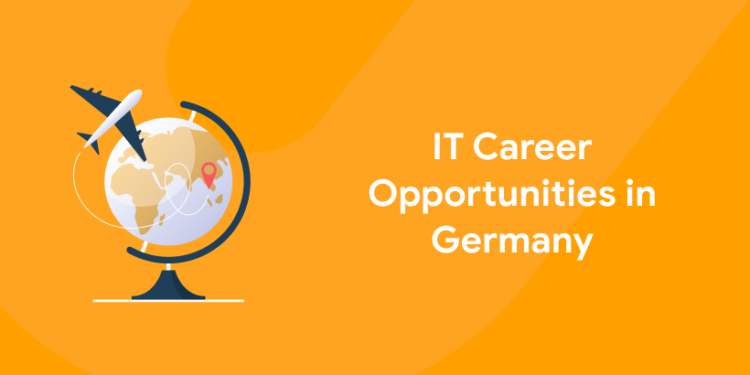Table of Contents
Key Takeaways:
- Germany is a global hotspot for IT careers in 2026, with high demand and competitive salaries.
- Roles like software developer, data scientist, and AI engineer are in high demand.
- Work culture emphasizes balance, flexibility, and innovation.
- The Schengen visa offers mobility across Europe.
- Learning German can significantly boost your career prospects in Germany’s IT sector.
Introduction
Germany’s IT industry is not just thriving—it’s leading the charge in digital innovation across Europe. With over 109,000 vacant IT positions in 2025 and a turnover of €307 billion, the sector is one of the most dynamic and in-demand fields in the country. For professionals worldwide, Germany offers a unique blend of cutting-edge technology, competitive salaries, and a culture that values both innovation and work-life balance. Whether you’re a software developer, data scientist, cybersecurity expert, or AI engineer, the opportunities are vast and the future is bright.
In-Demand IT Roles in Germany
1: How do you say "Good Morning" in German?
Germany’s IT sector is a hub of innovation, with a diverse range of roles that cater to every technical skill set. Here’s a look at some of the most sought-after IT positions in Germany for 2026:
- Software Developer: Software developers are responsible for designing, coding, and maintaining applications that drive business processes and customer experiences. They work across industries, from finance to healthcare, creating solutions that are both functional and user-friendly.
- Data Scientist: Data scientists analyze large datasets to extract actionable insights, helping companies make informed decisions. Their work is crucial in fields like marketing, logistics, and healthcare, where data-driven strategies are key to success.
- IT Security Specialist: With the rise in cyber threats, IT security specialists are in high demand. They protect sensitive information, implement security protocols, and ensure compliance with data protection regulations. Their expertise is essential for maintaining the integrity of digital systems.
- Application Support Engineer: Application support engineers provide technical assistance for software systems, ensuring smooth operation and troubleshooting issues. They bridge the gap between technical teams and end-users, making them vital for business continuity.
- AI and Machine Learning Engineer: AI and machine learning engineers develop intelligent systems that automate processes and enhance decision-making. Their work is at the forefront of innovation, shaping the future of technology in Germany.
Also read: Top Industries and Career Opportunities in Germany
Free German A1 Mock Tests – Powered by AI!
Test your skills on our interactive platform. Get instant feedback from our AI to help you communicate better and track your progress. Start your free German mock test now.
Test Your German A1 for FreeSalary Expectations and Comparison
IT professionals in Germany enjoy some of the highest salaries in Europe, reflecting the sector’s demand and the value placed on technical expertise. The average annual salary for IT roles ranges from €60,000 for software developers to €78,000 for AI specialists and €81,000 for cybersecurity experts. Senior roles and leadership positions can command even higher compensation, particularly in major tech hubs like Berlin, Munich, and Hamburg.
| Role | Average Annual Salary (€) |
|---|---|
| Software Developer | 60,000 |
| Data Scientist | 75,000 |
| AI Specialist | 78,000 |
| Cybersecurity Specialist | 81,000 |
| App Developer | 62,000 |
| Cloud Architect | 71,000 |
Salaries are further enhanced by generous benefits, including health insurance, retirement plans, and paid vacation, making Germany a highly attractive destination for IT professionals.
People also read: Salary Guide for Germany
|
German A2 Exercises – Download Free PDF |
||
Work Culture and Lifestyle
Germany’s work culture is known for its efficiency, structure, and respect for work-life balance. Employees benefit from flexible working models, including hybrid and remote options, with 64% of companies offering remote work arrangements. The emphasis is on productivity rather than long hours, allowing professionals to excel without sacrificing personal time.
German companies value clear communication, punctuality, and meticulous planning. Employees enjoy generous paid holidays, parental leave, and public holidays, ensuring a fulfilling personal life alongside a successful career. The supportive environment extends to professional development, with opportunities for upskilling and career advancement.
You might also like: Germany Raises Minimum Wages!
Future Prospects in Germany’s IT Sector
Germany’s IT sector is set for robust growth and innovation in 2026, offering exciting opportunities for professionals. Key trends and developments include:
-
Strong Government Investment:
Germany plans to invest 3.5% of GDP in research and development by 2025, fueling continuous innovation and job creation in the IT sector.
-
Digital Transformation Expansion:
The digital transformation market is projected to exceed USD 300 billion by 2024, with ongoing growth expected as businesses across industries adopt advanced technologies.
-
Industry 4.0 and Beyond:
Manufacturing, healthcare, and professional services are leading the charge in digital adoption, with a focus on human-machine collaboration, automation, and data-driven processes.
-
Emerging Technologies:
Artificial intelligence, cloud computing, cybersecurity, big data, and the Internet of Things are driving innovation and creating new job roles.
-
Support for SMEs:
Federal and regional subsidy schemes are helping small and medium enterprises (SMEs) adopt digital solutions, increasing demand for IT services and skilled professionals.
-
High Demand for Skilled Professionals:
There is a significant shortage of qualified IT professionals, leading to high salaries and excellent job prospects for those with the right skills and experience.
-
EU Digital Decade Program:
Germany is benefiting from EU funding, with over EUR 2 billion allocated to high-performance computing, cybersecurity infrastructure, and advanced connectivity by 2027.
-
Geographic Diversification:
The demand for IT services is spreading across regions, reinforcing Germany’s role as a hub for compliant, pan-European IT solutions.
-
Continuous Learning and Upskilling:
The dynamic environment requires IT professionals to stay updated with the latest technologies and trends, offering ample opportunities for career advancement and international collaboration.
These factors make Germany a prime destination for tech talent, with a vibrant ecosystem that supports innovation, career growth, and long-term success in the IT sector.
|
Goethe 2025 Exam Dates: Multiple Test Centers |
|
| Trivandrum Goethe Exam Dates | Kochi Goethe Exam Dates |
| Chennai Goethe Exam Dates | Coimbatore Goethe Exam Dates |
Free German A1 Mock Tests – Powered by AI!
Test your skills on our interactive platform. Get instant feedback from our AI to help you communicate better and track your progress. Start your free German mock test now.
Test Your German A1 for FreeSchengen Visa and European Mobility
A German work visa grants IT professionals access to the Schengen Area, which includes 26 European countries. This mobility allows professionals to travel, network, and explore career opportunities across Europe. The Schengen visa is a significant advantage for those looking to expand their horizons, collaborate internationally, or pursue projects beyond Germany.
Also read: What Level of German is Required to Work in Germany?
How Learning German Boosts Your IT Career
Learning German can significantly enhance your career prospects in Germany’s IT sector. While many tech roles are conducted in English, German language skills open doors to more job opportunities, especially in client-facing or management roles. Entri’s German language course is tailored for professionals aiming to master German quickly and effectively. The course covers essential vocabulary, grammar, and practical communication skills tailored for the IT sector.
The Entri German language course offers live interactive sessions with experienced instructors, flexible schedules, and comprehensive learning materials. It includes demo classes, assessments, recorded sessions, mock tests, and personalized feedback. The curriculum is structured to help learners achieve fluency in speaking, reading, writing, and understanding German, from beginner (A1) to advanced (C2) levels.
Key benefits of the Entri German language course include:
- Language Proficiency: Achieve fluency in German for professional and personal use.
- Enhanced Communication: Improve verbal and written communication skills in a foreign language setting.
- Cognitive Development: Strengthen memory, problem-solving, and multitasking abilities.
- Career Advancement: Increase job opportunities, particularly in multinational companies.
- Personal Growth: Experience growth and development through mastering a new language.
- Networking Opportunities: Connect with the global community of German speakers for personal and professional networking.
- Sense of Achievement: Enjoy the fulfillment of acquiring a valuable and widely spoken language skill.
By enrolling in Entri’s German language course, you gain a competitive edge and improve your chances of landing top roles in Germany’s IT sector. The course is designed to fit your schedule, making it ideal for busy professionals aiming to advance their careers.
Conclusion
Germany in 2026 stands as a beacon for IT professionals seeking a rewarding and innovative career. With high salaries, a supportive work environment, and opportunities to work on cutting-edge projects, Germany offers everything ambitious tech talent is looking for. Whether you’re starting your journey or aiming to advance your career, now is the perfect time to explore IT opportunities in Germany. Take the first step today and unlock a future filled with innovation, growth, and endless possibilities.
Free German A1 Mock Tests – Powered by AI!
Test your skills on our interactive platform. Get instant feedback from our AI to help you communicate better and track your progress. Start your free German mock test now.
Test Your German A1 for FreeFrequently Asked Questions
Do I need to know German to work in IT in Germany?
English is widely spoken, but German skills can boost your job prospects and integration.
How long does it take to get a job in Germany’s IT sector?
With relevant skills and experience, most professionals find jobs within 3–5 months.
What are the visa requirements for IT professionals?
Germany offers work visas for skilled professionals, with faster processing for IT roles due to high demand.
Are there opportunities for career growth in Germany’s IT industry?
Yes, Germany’s tech sector is growing rapidly, offering plenty of advancement and upskilling opportunities.
Can I travel to other European countries with a German work visa?
Yes, the Schengen visa allows free movement across 26 European countries.















